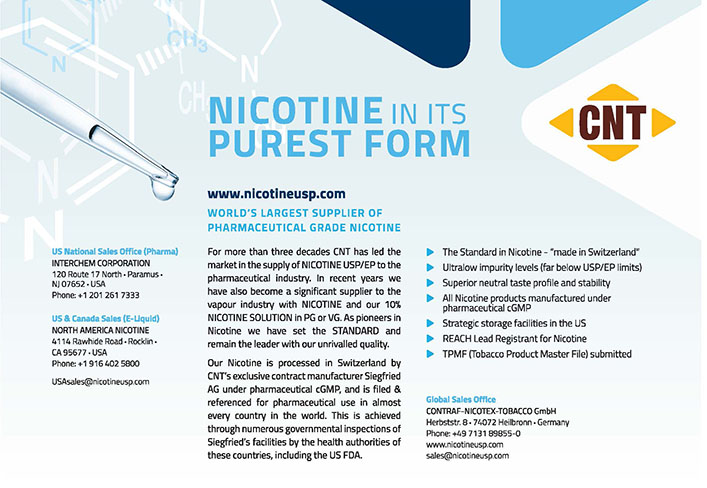Many small vapor businesses have not been able to recover from the EVALI panic caused by the U.S. CDC.
By John Castle
Any small business is liable to face obstacles, including financial, logistical and bureaucratic issues. A small business in an industry centered on disruptive technology also faces not only those obstacles but outright hostility from their well-entrenched and well-funded legacy industry competitors. Add on various levels of government dependent on the revenue generated by those legacy competitors and going into business can, in a sense, mean going to war.
By now, we all know what happened in the late summer of 2019. To give the following its proper context, however, perhaps a very brief recap is in order. Beginning in July and progressing into August, adolescents began arriving at local hospitals with symptoms similar to those of acute lipoid pneumonia. Each patient said they had been vaping (either THC, nicotine or both).
On Aug. 23, the first reported death related to this phenomenon emerged from Illinois health officials. It would not be until December 2019 that the U.S. Centers for Disease Control and Prevention (CDC) would conclusively state that the culprit behind the illnesses and deaths was not nicotine vaping but the use of black market THC products adulterated with vitamin E acetate. By then, the damage caused by their ambiguous reporting and the ensuing media firestorm was unrepairable.
Many small businesses faced devastation and even closure as a result of lost sales that were driven both by consumer fears and regulatory overreaction. States like Massachusetts and New York enacted bans, amplifying a trend that had previously been seen only at the municipal and county levels in states such as California. The panic caused by what the CDC has labeled e-cigarette or vaping-associated lung injury (EVALI) was so powerful that it reached the United Kingdom.
Andy Brown, an employee at a vape shop in Mildenhall, England, for the past three years, came into the business prior to the establishment of the European Tobacco Products Directive (TPD). With a small-town shop surrounded by three American military bases, most of Brown’s customers were American service members.
Brown explained that shortly after the crisis began in the U.S., British wholesalers and others in the trade stated that average sales were down 30 percent to 50 percent across the country. “The subsequent news articles around the world have since undone so much hard work in harm reduction. People that had switched from smoking to vaping were returning to cigarettes believing that it was the safer option,” Brown said. “This has been an issue worldwide, and despite the truth eventually coming out about the real cause of the illnesses and in the U.K. Public Health England and the Royal College of Physicians standing by their well-researched claims that vaping remains at least 95 percent safer than using combustible tobacco, the media had already done so much damage.”
Back in the U.S., Jennifer Madsen of Dripped Out Vapers in Palm Bay, Florida, said she saw her business sales decimated, and the effects have been far-reaching. While noting that she can only speak directly about her business, she added that she knows the entire state’s vapor industry felt the impact. “I think that people not involved in vaping don’t understand the community. Vape shops aren’t just retail shops that supply a product,” Madsen said. “For a lot of people, we become a club, a place to make friends, to vent about your job and family, to be heard and to be accepted. I’ve had customers come to me and ask if they can meet a blind date at my shop (we have beer and wine) because they feel safe there. I’ve had customers bring their new boyfriends/girlfriends to meet me because we’ve become a family; we’ve become part of each other’s lives.”
For many like Lisa Talarico of Exotic Vapors in Buffalo, New York, and Elizabeth Robinson Pharis of Underground Vapor Lounge in Rusk, Texas, financially crippled businesses have already meant lost employees and lost jobs that may or may not return. “I own a vape shop in New York [and] my sales are down over 50 percent [with] some days even as high as 80 percent,” said Talarico. “I am working seven days a week now because I had to lay my employee off.”
Pharis said she understands the issues Talarico has been facing. She explains that her business saw a significant drop in sales too. “We are the only vape shop in town; we still weren’t safe from the hype. Business dropped 70 percent and we’re still not beginning to recover. We let go of all of our employees, and my daughter had to drop out of college; we just couldn’t afford it,” she said. “I still wake up every morning waiting for the bomb to go off and hear an announcement that flavors are now gone. I just wish there was a definitive answer.”
The effects of the CDC’s and the media’s reporting weren’t confined to vape shops. Even comparatively large businesses such as manufacturers and distributors were crippled. Chris Weidlich, a former employee of Purebacco USA, said the ban cost him his livelihood. “I have been an employee with Purebacco USA where we manufactured for Akston Hughes, FlavorZ and Namberjuice e-liquid brands,” he said. “A Michigan flavor ban enacted by the governor set in motion a series of events that have led to the permanent closing of a legacy manufacturing company and the unemployment of many employees, including my own imminent loss of employment at the end of [2019].”
Some businesses have begun to see some recovery. However, the uncertainty of the industry still haunts them. Andrew Simpson with Tri Guys Vapor in Salem, Missouri, said the EVALI panic hit his business with full force. “A month after the ‘outbreak’ started, I had to take my employees down to part time. We survived like that for a while. Then Trump announced that he was going to ban flavors. The next day, I wrote my employees a month’s wage check each and told them that they deserve to have a chance to find a job because I [knew] I wouldn’t be able to afford to pay them the next month due to sales continuing to drop,” explained Simpson. “For the first time in my life, and before my child was born, I was petrified that I couldn’t give my family the life that I promised my wife when I married her. I was scared we weren’t going to have a home for my child. I was scared he wasn’t going to have clothes. I was scared he would go hungry. I was just plain scared.”
Simpson said he quit his job as an emergency medical technician so he could give his undivided attention to his vape shop. “I cut all of my costs down to nothing. I hunkered down and budgeted and prepared the shop to be able to stay open for four months without making a dime (I’m thankful it never had to come to that),” he said. “But we had to radically change our lives to prepare for the worst. We looked at options and were prepared to go completely bankrupt. But I wasn’t ready to give up on my business and customers. We were already in debt … and were looking at bankruptcy anyway; what does it matter if we’re completely broke when we closed.”
While Tri Guys has recovered to a level Simpson describes as “only down about 20 percent from our average before all the propaganda happened,” he says the fear and sense of betrayal remain. “It really showed me how corrupt and broken our system is. This known and proven life-saving technology is going to be ripped off the market because of money,” he said. “They genuinely don’t care about the American people. They don’t care that 440,000 people die so they can get a paycheck. They don’t care about me or my family like I thought they did growing up. I’ve never felt so betrayed.”
The vapor industry doesn’t seem optimistic about vaping’s prospects in 2020 either. However, there are a lot of fighters still not ready to call it quits. Many of the owners who are still in the fight say that a fight is exactly what this is. Brown could only offer a call to action. “The truth needs to be shared far and wide. Be under no illusion that if nothing is happening in your country that affects vaping [then] nothing will. Don’t be the, ‘I’m all right, Jack’ person,” Brown said. “Share your experiences with people, tell the truth about life-saving vapor products and harm reduction, and advocate until you are blue in the face. If we don’t fight to keep our vapor products, we will lose them.”

